:quality(80)/business-review.eu/wp-content/uploads/2023/07/foto-main-story-1-scaled.jpg)
More than half of the world’s population lives in cities, and most future population growth is predicted to occur in urban areas. Cities are also responsible for 70 percent of global GHG emissions, according to the United Nations Development Programme (UNDP)¬—and they are highly exposed to many of the impacts of the climate change to which they massively contribute, in particular heat stress, flooding, and health emergencies. All of this makes clear the urgent need to transform our cities into smart(er) and (more) sustainable communities.
By Anda Sebesi
Climate change, digital transformation, and the aspirations of the young generations are just some of the challenges players in the real estate sector are facing today. “New generations are forcing us to rethink our operating models, not to mention our consumption habits. However, we are convinced that the future winners in the real estate industry will be those who place sustainability and people’s experiences at the heart of their investment decisions—as these are attributes we believe are now more important than ever before,” says Ioan Bejan, Sustainability Director at Genesis Property. Along the same lines, Jan Demeyere, Architect, Co-founder, and Partner at Speedwell, says that from the real estate perspective, a green, smart, and sustainable city means energy-efficient buildings, more green space, and fewer cars. “It is an urban environment that integrates sustainable principles and practices, advanced technologies, and responsible urban planning; it promotes public transport, active mobility, and the use of low-emission vehicles,” he explains.
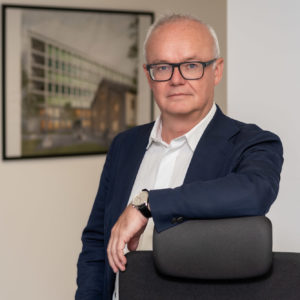
In her turn, Beatrice Dumitrascu, the CEO of the Residential Division at One United Properties, says that sustainable real estate includes commercial and residential property that is designed, built, and operated in a way that minimises environmental impact. “Certified buildings do that, and so do high-end energy efficiency solutions and real estate concepts that are focused on the people and their health,” she notes.
Doru Chirica, co-founder & CEO at tranzy.ai, argues that a smart and sustainable city features innovative urban planning that blends historical heritage with modern design, fostering a sense of community and enhancing people’s quality of life. “Through open data and efficient planning of resources, it manages public transport systems that adapt to real-time conditions, reducing congestion and enhancing mobility. A well-orchestrated public transport not only serves as the city’s circulatory system, but also connects humans, bringing them together, fostering interactions, making it easier to meet, interact, and feel a sense of community.” For him, a smart city is a city that provides a safe, efficient, and pleasing environment for a resilient and sustainable future. “In a sustainable community, doing good comes first. Members join forces to boost progress and well-being, fostering an environment of mutual support and fair competition. Their combined strength not only fortifies the community but also sets the groundwork for true sustainability,” Chirica adds.
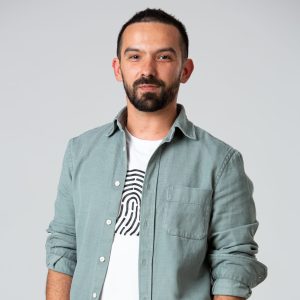
Creating a smart city means using technology and data to improve efficiency, connectivity, and quality of life for residents. For instance, cities may employ smart grids for energy distribution or digital platforms for citizen services and participation. “A sustainable city aims to meet the needs of its present population without compromising the ability of future generations to meet their own needs,” says Cosmin Savu-Cristescu, Managing Director at Redport Capital.
Speedwell: a holistic view of the community
From the very beginning, Speedwell’s approach has been based on a strong sustainability component, seen as an integral part of a higher living standard, and by no means a separate element. This translates into building developments that use efficient materials and technologies made to enhance residents’ health and reduce impact on the environment. “It is customary already that with each project we develop, Speedwell emphasises the use of renewable energy sources and the implementation of lighting, thermal insulation, and air conditioning systems to minimise energy consumption. Furthermore, most of our projects are urban regeneration projects. This means we are building on abandoned industrial sites that are no longer being used by the city’s inhabitants,” says Demeyere. The company’s developments are designed to reduce both the environmental impact and utility costs for residents. This is achieved across all segments by using energy efficient materials, installing photovoltaic panels and heat pumps, reusing rainwater or reducing electricity use.
“In the development of our projects, we follow a holistic perspective that considers all aspects of a community. We engage in sustainable urban planning, taking into account public transport connectivity, access to essential amenities and services, and the creation of green spaces and parks,” Demeyere adds.
Redport Capital: keeping an eye on future technologies
Buildings are part of ecosystems: cities, regions, the world. They should be designed keeping in mind how they can work together with all the other elements. As a result, a building is “smart” when it enables us to make intelligent, reasoned, efficient, and convenient choices.
“Our strategy is based on the fact that the building should not only be suitable for the technologies that are available on the market today, but be truly future-proof, ready for the technologies that might arrive in the future. This is why our strategy focuses on three areas: energy savings and operations; responding to user needs; and energy demand flexibility. The challenge is to create a dialogue between networks and buildings so that everyone can benefit from this joint effort, managing energy flows in the most efficient way,” says Cosmin Savu-Cristescu of Redport Capital.
Through its projects, the company contributes to the creation of sustainable communities in several ways. First, it prioritises environmental sustainability by implementing eco-friendly practices and promoting renewable energy sources. Second, it focuses on social sustainability. “Our projects aim to create spaces that promote social interaction and a sense of belonging. We incorporate communal areas, parks, and green spaces where residents can come together, strengthening social bonds,” Cristescu explains. Last but not least, Redport Capital prioritises economic sustainability by promoting local businesses and job creation. “We collaborate with different retailers in order to respond to all the potential needs of a community and support it with job opportunities in the services sector for every residential project we develop.”
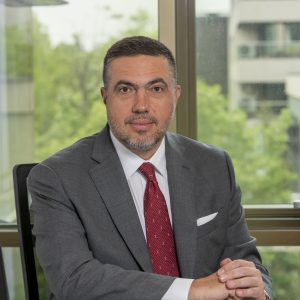
Genesis Property: making urban spaces more resilient
Changing lifestyles, the emergence of new ways of working and mobility, and the growth of the collaborative economy—these social and technological changes are transforming the expectations and needs of today’s customers. “We are aware that future offices must be magnetic enough to inspire current and prospective employees to come in, collaborate, and participate in a university-like culture of continuous learning. Our business parks are living environments, places to meet and gather that are open to everyone, bringing together communities of all kinds, both physical and virtual. By expanding our dining options, organising a wide range of events, and refining our services, we design customer experiences that are exciting and enjoyable,” says Ioan Bejan, adding that the company’s vision is to transform the sites that it owns and manages into healthier and more resilient spaces where nature and people’s needs are harmoniously integrated, thus redefining the future of working and urban living. “This approach is reflected in everything our group already does, but also in its future plans, and the project to transform Novo Park into YUNITY Park is the best proof of our new strategy.”
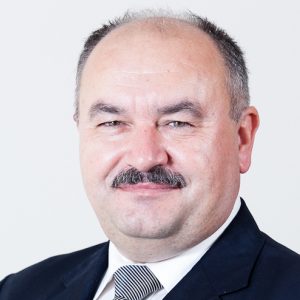
Genesis Property is already committed to an ambitious 2040 net zero carbon target for scopes 1, 2 & 3 emissions, as well as their reduction at a rate at least in line with the 1.5°C pathway, validated as such by SBTi. “As an intermediary target, all our buildings will become zero emission buildings (ZEB) by 2030, as defined by the EU Energy Performance of Buildings Directive,” Bejan notes.
One United Properties: betting on urban regeneration
Beatrice Dumitrascu of One United Properties says that building responsibly has always been a priority for the company. “As a developer of sustainable real estate, we always focus on delivering a 100% Green Homes certified residential portfolio and a 100% LEED and WELL certified office portfolio. We also pledge that all our new office developments will meet the LEED Zero Carbon standards. Green buildings mean more than high energy efficiency, as they use fewer resources, reduce waste generated during construction and operation phases, have a lower negative impact on the environment, and at the same time support people’s health. All One United Properties developments hold superior certifications in sustainability, energy efficiency, and wellness,” she says. The company focuses on mixed-use developments that work against the trends of sprawling cities and instead help create inclusive, connected communities. “At the same time, our developments are based on the concept of urban regeneration, meaning that we build on abandoned industrial sites and transform them intro landmark communities,” Dumitrascu adds. Examples of such projects include One Floreasca City, One Cotroceni Park, and One Herastrau Towers, to name a few.

In terms of innovative energy solutions, One United Properties uses in solar panels, geothermal pumps, geoexchange systems or energy-recovering elevators. “At the beginning of 2022, One United Properties launched a partnership with Veolia to bring to future developments the most advanced and environmentally friendly source of energy: geoexchange solution. It does not emit carbon dioxide, carbon monoxide nor other greenhouse gases that contribute to air pollution. By implementing a geoexchange solution as opposed to a traditional one, we can avoid about 2,000 tonnes of CO2 emissions a year,” she notes.
Nusco Imobiliara: focus on green areas
“It is increasingly evident in our mission that we all need to contribute to protecting the planet. Whether we are companies or simply individuals, communities or families, we have a duty to take care of the Earth. So a green and sustainable city, first of all, means our actions as people, and for a company, it means all the green projects it carries out,” says Bogdan Iliescu, Commercial Director at Nusco Imobiliara. He notes that Nusco City has sketched perhaps the largest space dedicated to green areas since the project phase. “We are now at the project’s second phase, with the first 600 units having been put into use for our residents, and the green area already covers 6,000 sqm; in the second phase, we will add 24,000 sqm of green space. Also, the entire project includes electric heat pumps, and we are considering the possibility of installing photovoltaic panels on our buildings for the subsequent phases,” he says
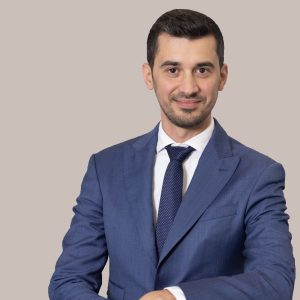
.
Maurer Imobiliare: innovation for the future
Maurer Imobiliare developed the concept of 4GENERATIONS apartments, where it has integrated innovative solutions and technology, resulting in the RoomInnovation 4generations concept. “This concept comes with a smart and versatile compartmentalisation of the apartment, which will be composed of 2 completely independent units, fitted with all the utilities, and the owner of the apartment may use the whole apartment or only the master unit, while the other unit may be use for their professional or social needs or to develop a business. This apartment comes equipped with our smart-home RoomInnovation concept (with an integrated system of mobile beds and retractable walls that can change the configuration of the home within seconds,” says Cristina Tirea, Marketing and Sales Director at Maurer Imobiliare. She says that in order to create this concept, the company took into account several aspects, such as: improving the effciency of living spaces; optimising the compartmentalisation method; reusing resources; generating income for a circular economy; cutting energy use; and reducing pollution rates. “From our point of view, people should live in spaces that they can manage, spaces that they can use in their entirety. When instead of 4 rooms, you live in 2, but you have the same utilities and you can benefit from the same functionality, you become sustainable,” Tirea argues. The concept also brings significantly reduced energy and maintenance costs. “We basically offer this concept apartment at the same price as a normal apartment—it just has all the functionalities that come along with the new technology.”
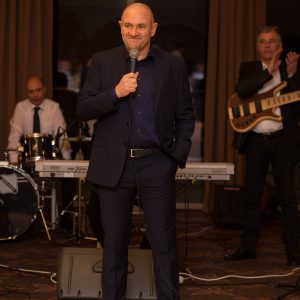
IULIUS: an innovative approach of the communities
For IULIUS, sustainability is an integral part of its business model, as evidenced by the complex urban regeneration projects either developed or under development, which add substantially to the life of the communities and the cities. IULIUS projects are innovative concepts that integrate large gardens, buildings designed to be as efficient and resilient as possible in the face of new climate challenges, environmentally and people friendly, contributing significantly to economic development, investment and tourism attractiveness, translated into increased quality of life. “But beyond the operational aspects, we guide our steps according to a strategy designed to implement specific actions in line with the company’s vision, mission and values,” says Dan Adrian Chelaru, Group Sustainability Officer at Iulius.
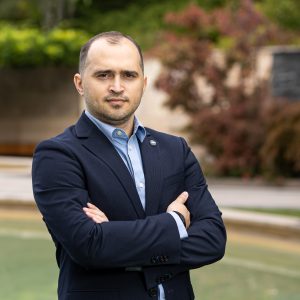
The portfolio of IULIUS Company is comprised of green buildings whose high level of performance is attested by their certifications. All buildings are LEED certified, fitted with technologies measuring up to the highest standards that contribute to their efficient operation. “We try to take a holistic approach to assessing the environmental impact of a building as early as its design phase, taking into account several factors that will help minimize carbon emissions throughout the building’s life cycle. Despite higher investment costs, sustainable buildings help reduce long-term operational costs through more efficient use of resources and mitigate environmental impacts,” says Chelaru.
Our strategy is built on many important aspects, such as the newly created gardens in Palas Iași, Iulius Town Timișoara and Iulius Cluj-Napoca, a hallmark of IULIUS projects, with the community becoming attached to these gardens as they have become important urban and social landmarks. Then, there is the company’s engagement towards education, through various programs designed to develop and integrate local talents. “In addition, waste management is central to our efforts to reduce our environmental impact. In this respect, we have successfully increased the percentage of recyclable waste, both through better collection-at-the-source and by increasing the percentage of waste recovery, in our pursuit to achieving the Zero Waste to Landfill target,” adds Chelaru. In his opinion, a smart city refers to the use of technology and digital infrastructure to streamline the operation of projects and to facilitate interaction between the community and the public or private sector, as well as the use of IoT systems dedicated exclusively to buildings, as well as monitoring and control solutions for the consumption of energy and various resources.
e-Mobility Rentals: turning cities into sustainable hubs
According to Alexandru Vasiliu, Sales & Marketing Manager at e-Mobility Rentals, transportation is one aspect that needs urgent action. “As urban environments continue to face the challenge of congestion, which generates tonnes of carbon emissions and limits transportation options, it is crucial to embrace innovative solutions that can transform cities into thriving, sustainable hubs where people love to live.” The company offers electric vehicles that operate on swappable & universal batteries, plus the infrastructure of battery swap stations in Bucharest and soon in Europe. “Our fleets can support smart city projects and help municipalities position themselves as leaders in sustainable transportation and reap the rewards of a connected, efficient, and environmentally friendly urban landscape. By integrating micromobility and electric mobility into any city’s transportation ecosystem and into its public services—cleaning, security, social services, and others—, local decision-makers can cut costs from budgets that otherwise would be spent on internal combustion cars, fuel, insurance, and maintenance,” Vasiliu points out. He adds that the company’s electric vehicles can be used daily for administrative duties and other local missions: police, cleaning, public administration field tasks, etc. “Strategically placed Battery Swap Stations will ensure uninterrupted journeys, allowing workers (and residents that choose this option) to exchange depleted batteries for fully charged ones in less than 1 minute and thus carry on with their responsibilities,” he adds.
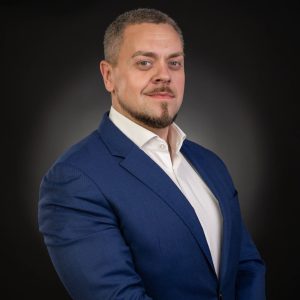
Orange Business: covering the main verticals of a smart city
A smart city is an urban development concept integrating technologies and systems to manage resources efficiently and securely, improve the quality of citizens’ lives, develop the community, and protect the environment. Orange Business has developed a portfolio of solutions that cover the main verticals for a smart city—connectivity, e-governance, cyber security, data analytics—as well as solutions dedicated to utility companies and smart urban infrastructure, based on IoT technology. “Solutions on their own can only do so much, and we believe cities need an open and interoperable platform of intelligent solutions that communicate with each other and allow further development based on collected data,” says Razvan Mocanu, digital city & IOT manager at Orange Romania Communications. The company now has over 30 cities and many more smaller localities covered with smart city solutions, and it continues to deploy new projects.
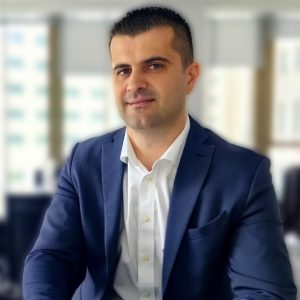
Orange Business has been one of the most important integrators of smart city solutions and a pioneer of the concept, since 2018. Back then, Alba Iulia City Hall and Orange started the first national smart city pilot programme, the most complex one to date, to mark the Great Union’s 100th anniversary by developing and digitalizing the city. “After this success, we started smart transportation commercial projects in Iasi, Sibiu, and Suceava, we’ve implemented numerous projects on public lighting for various municipalities (Bistrita, Focsani, Nehoiu, Giurgiu, Rasnov, and many others), projects for electric car charging stations in Galati, Giurgiu, and Ramnicu Valcea, and we’re also working on a waste management solution in the north of Romania. We also continue our innovation projects powered by our 5G Labs in Iasi and Bucharest. Last but not least, Raja Constanta, the largest public regional operator in the field of drinking water supply and wastewater treatment, was developed with Orange Business and it is based on an Augmented Team solution. “With it, employees have simultaneous access to work sites, resulting in faster interventions and reductions in operational costs (e.g., energy savings). The remote assistance application combines augmented reality (AR) and real-time video transmission to connect people simultaneously, while Orange 5G infrastructure ensures the good quality of video streams through low latencies and high speeds,” Mocanu says.
Quotes
Jan Demeyere, Architect, Co-founder and Partner at Speedwell
“It is an urban environment that integrates sustainable principles and practices, advanced technologies, and responsible urban planning; it promotes public transport, active mobility, and the use of low-emission vehicles.”
Cosmin Savu-Cristescu, Managing Director at Redport Capital
“Our strategy is based on the fact that the building should not only be suitable for the technologies that are available on the market today, but be truly future-proof, ready for the technologies that might arrive in the future.”
Ioan Bejan, Sustainability Director at Genesis Property
“We are convinced that the future winners in the real estate industry will be those who place sustainability and people’s experiences at the heart of their investment decisions—as these are attributes we believe are now more important than ever before.”
Beatrice Dumitrascu, the CEO of the Residential Division at One United Properties
“At the beginning of 2022, One United Properties launched a partnership with Veolia to bring to future developments the most advanced and environmentally friendly source of energy: geoexchange solution.”
Bogdan Iliescu, Commercial Director at Nusco Imobiliara
“It is increasingly evident in our mission that we all need to contribute to protecting the planet. Whether we are companies or simply individuals, communities or families, we have a duty to take care of the Earth.”
Doru Chirica, Co-founder & CEO at tranzy.ai
“A well-orchestrated public transport not only serves as the city’s circulatory system, but also connects humans, bringing them together, fostering interactions, making it easier to meet, interact, and feel a sense of community.”
Razvan Mocanu, digital city & IOT manager at Orange Romania Communications
“Solutions on their own can only do so much, and we believe cities need an open and interoperable platform of intelligent solutions that communicate with each other and allow further development based on collected data.”
Adrian Chelaru, Group Sustainability Officer at IULIUS
“A coherent urban regeneration project strategy, consistently pursued throughout its implementation, directly contributes to building strong and sustainable communities.”
Alexandru Vasiliu, Sales & Marketing Manager, e-Mobility Rentals
“Our fleets can support smart city projects and help municipalities position themselves as leaders in sustainable transportation and reap the rewards of a connected, efficient, and environmentally friendly urban landscape.”
Simon Maurer, Founder Maurer Imobiliare and RoomInnovation
“People should live in spaces that they can manage, spaces that they can use in their entirety. When instead of 4 rooms, you live in 2, but you have the same utilities and you can benefit from the same functionality, you become sustainable.”



:quality(80)/business-review.eu/wp-content/uploads/2024/04/Alexandru-Vasiliu.jpg)




:quality(80)/business-review.eu/wp-content/uploads/2024/02/IMG_6951.jpg)

:quality(80)/business-review.eu/wp-content/uploads/2024/04/COVER-1.jpg)



:quality(50)/business-review.eu/wp-content/uploads/2024/03/Screenshot-2024-03-14-at-12.55.37 PM.png)
:quality(50)/business-review.eu/wp-content/uploads/2023/12/beatrice-25.jpg)
:quality(50)/business-review.eu/wp-content/uploads/2023/11/ESS2-1.jpg)
:quality(80)/business-review.eu/wp-content/uploads/2024/04/cover-april.jpg)
:quality(50)/business-review.eu/wp-content/uploads/2024/04/FOT_9989-7-scaled.jpg)
:quality(50)/business-review.eu/wp-content/uploads/2023/08/One-Floreasca-City-2-scaled.jpg)
:quality(50)/business-review.eu/wp-content/uploads/2024/04/ROMTEXTIL-2.jpg)